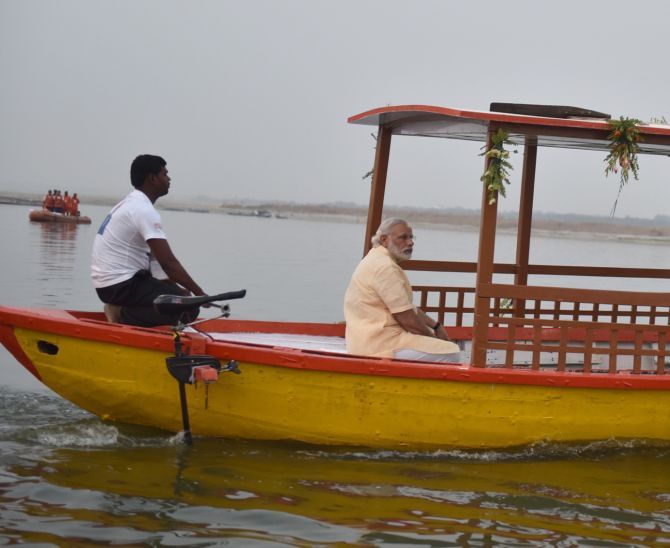Accusing the erstwhile Congress governments of pursuing "vote bank politics", Prime Minister Narendra Modi on Sunday took potshots at Nehru-Gandhi family and reached out to the numerically significant Nishad community in Uttar Pradesh as he launched solar-powered boats for plying on river Ganga.

"India has launched seven satellites to augment the GPS system. With the kind of politics going on in our country and massive work being done, it came to our mind that let's name it (the solar-powered boat project) after Pandit Deendayal Upadhyay or Shayma Prasad Mukherjee (the Rashtriya Swayamsevak Sangh icons).
"You have already seen how many schemes are named after one family. We also felt tempted to name the project after those who belonged to us. But this Modi is made of a different stuff. I named it Naavik (boatman). I did not name it after any of my family members or any leader. I have given a name, which gives immortality to the fishermen community," Modi said.
Launching 11 solar-powered "e-boats" at the Assi Ghat, the prime minister said that the step is in line with his government's focus on making long-term interventions to empower the poor in their fight against poverty and climb up the ladder, which was not the case during previous governments.
"Unfortunately politics in our country took a direction in which policies were always made to strengthen vote bank. The focus was that the vote bank should remain strong, irrespective of whether the poor, the citizens of the country, get empowered or not or the country is strengthened or not.
"Earlier when something was talked about our Nishad brothers, the price of diesel was brought down by one rupee or so in the hope that they will cast their vote in favour. But we have made schemes, which empower the poor to fight and defeat the poverty themselves. We are working in that direction," he said listing a number of other schemes.
Reaching out to the backward fishermen and boatmen communities (kevat, nishad, machchuara) and addressing them as "brothers", the prime minister said his government is "for the poor".
Earlier speaking in Ballia, where he launched a Rs 8000 crore scheme to provide free LPG connections to five crore poor families, the prime minister hit out at the erstwhile Congress-led governments, saying most policies under them were made keeping the ballot box in mind and not for development or poverty alleviation.

Uttar Pradesh has given so many Prime Ministers. But why did the poverty levels go on increasing? Were there some drawbacks in these policies?" he asked.
He said an MP from Ghazipur had raised the issue of abject poverty in eastern UP when Jawaharlal Nehru was the prime minister following which a commission was formed which made several major recommendations.
"What happened to those recommendations, only God knows. Fifty years have passed since then. One of the recommendations was to connect Ghazipur and Mau by rail. We have now decided to construct a rail line to implement that recommendation," Modi said.
In Varanasi, the prime minister said his government believes in "going to the root" of problems to resolve them otherwise the situation remains stagnants while elections and formation of governments keep on happening.
"Even after passage of 70 years since India got independence, the doors of banks were closed for 40 per cent of Indians. The Prime Minister Jan Dhan Yojana launched by our government ensured that the poor are able to open their bank account with zero balance. Banks should remember that this government, the country and the banks belong to the poor," he said.
On his pet LPG scheme for the poor, the prime minister recalled that there was a time when people had to queue up before MPs, who used to have a quota for doling out gas connections to 25 people.
"That was also a government, which used to think big of it by giving 25 connections and this is also a government, which has decided to give gas connection to 5 crore families within 3 years," he said.
Contrasting the focus of his government against those that preceded it, Modi, whose dispensation has often been accused by Congress of pursuing "pro-rich and pro-corporate" policies said, "Many governments came in past, which worked for the rich. This time a government has come, which aims at benefiting the poor. This government is for those who have nobody else to fall back upon."

Addressing members of the boatmen and fishermen communities as "sisters and brothers", the Prime Minister said, "Earlier when elections used to come, the talk centred around how much diesel is to be given to the fishermen. Today, we are giving freedom to them from this and starting e-boats, which will produce no noise and save my Nishad brothers Rs 500 they spent daily on diesel.
"Earlier the government used to bring down the price of diesel by one or two rupees. Today with my one decision, each poor boatman will be able to save Rs 500 daily. Will he now be able to defeat poverty or not? One decision can bring about such a big change," he said.
Modi said these e-boats will also have mobile charging facility that would encourage tourists to go for boating and will result in greater earning for "thousands of my Navik, Kevat, Machchuaara sisters and brothers".
The Prime Minister urged the community to spend the money saved on education of their children and not on alcohol. He also appealed to people in his constituency to take up the cleanliness drive with full gusto.
Mallahs or Nishads constitute a sizeable segment of the electorate in Uttar Pradesh, which goes to polls next year. Stakes are high for the BJP in the key cow belt state where the party and its allies had won 73 of the 80 Lok Sabha seats in 2014 general elections.










